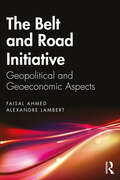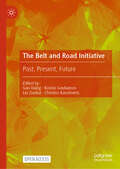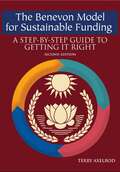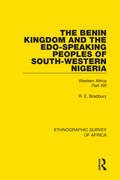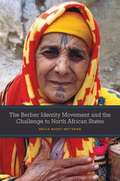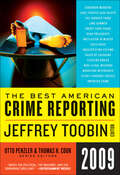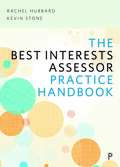- Table View
- List View
The Belt and Road Initiative and Australian Mainstream Media (Routledge Studies in Media, Communication, and Politics)
by Jon Yuan JiangThis book focuses on Australian mainstream media narratives about the Belt and Road Initiative (BRI) from 2013 to 2020. Set against the background of Sino-Australian relations and taking into account the different media systems of China and Australia, this book also critically investigates the Chinese public diplomacy narratives of the BRI. Drawing on my analysis and semi-structured interviews with prominent experts in this area, the book addresses an important but under-explored question: how have Australian mainstream media narratives portrayed the BRI of the Chinese Government from 2013 to 2020?This book fills a gap regarding the portrayal of the BRI in Australian mainstream media and provides new insights into the reasons for narrative shifts in the coverage of the BRI. More concretely, the book finds that the public diplomacy narratives of the BRI were not explained well by Chinese officials, thus allowing Australian journalists and commentators to project their own negative, fearful narratives of China onto the BRI project, particularly from 2017 onwards. More importantly, this book argues that the Australian Federal Government’s policy towards China had a significant impact on the Australian media’s coverage of the BRI; that the media clearly followed the Australian Federal Government’s lead, and not vice versa. Thus, in many ways, Australian mainstream media narratives of the BRI have had a similar outcome as China’s ostensibly much more restrictive and propagandistic state-dominated media system.Noticeably, this book not only has academic significance in the international research community but also holds practical importance in the real world, benefiting Australian business leaders, media professionals, think tank specialists, and policymakers.
The Belt and Road Initiative: Geopolitical and Geoeconomic Aspects
by Faisal Ahmed Alexandre LambertThis book studies the geopolitical and geoeconomic aspects of China’s Belt and Road Initiative (BRI). It argues that the BRI has the potential to redesign the spatial and territorial dimensions of governance and effectively counterbalance the hitherto predominant hegemonies of the Anglo-American sea power. The volume: Highlights the main geopolitical patterns, including geographical, economic, financial, technological, and strategic factors guiding the BRI on a global scale Presents a historical account of the development of the Silk Road and underlines its contemporary relevance Traces China’s growing inf luence from Eurasia to America Discusses how the Initiative is likely to transform international relations by the middle of the 21st century. A comprehensive guide to China’s rise as the new centre of gravity in global geopolitics, the book will be indispensable for students of political studies, geopolitics, international relations, and foreign policy. It will also be useful for policymakers, strategic investors, think tanks, and government officials.
The Belt and Road Initiative: Key Concepts
by Huping ShangThis book introduces the “Belt and Road” in its entirety, including what it is, what it aims to do, what it can do and how. This book can serve as a helpful resource for the general public, it can improve their understanding about the “Belt and Road” and its relative economics, policy, culture and so on. Also, this book is good reading for academics, as well as students of public management, politics, finance and economics. The “Belt and Road” advances a whole complementary set of new ideas on international cooperation. Conforming to the principles of peace and cooperation, openness and inclusiveness, mutual learning and mutual benefit, it stipulates policy coordination, facilitates connectivity, unimpeded trade, financial integration and people-to-people bonds as the five major contents, and promotes practical cooperation in all fields. It also works to build an open and win-win regional community featuring mutual political trust, economic integration and cultural inclusiveness.
The Belt and Road Initiative: Past, Present, Future
by Christos Kassimeris Kostas Gouliamos Liu Zuokui Gao XiangThis open access book presents the main theme which advances the significance of cultural dialogue between China and Europe. The essence of the historical ties between China and Europe has resurfaced, much because of the Belt and Road Initiative launched in 2013 by China’s President Xi Jinping. The Belt and Road Initiative aims to bring China closer to Europe, Africa, and other parts of the world, as well as to connect certain parts of Asia into a huge network of countries through both land and maritime corridors. While the concept originally dates back to the Han Dynasty some 2,000 years ago, when the Silk Road developed into an ancient network of trade routes connecting Imperial China to the markets of the Mediterranean, the Belt and Road Initiative is better defined as a far more holistic approach. As per China’s Policy Paper on the European Union, one of the main aims of the Belt and Road Initiative is to “uphold inter-civilization dialogue and harmony in diversity to facilitate mutual learning between the Chinese and European civilizations”. It is precisely this mutual learning between the Chinese and European civilizations that the present book seeks to explore by means of delving into the historical aspect of intercultural dialogue and between China and Europe, while also proposing a prognosis of how the guiding principles of China–EU relations will develop with regard to inter-civilization dialogue.
The Benefits of the Cold and Domestication: A New Understanding of Human–Animal Partnerships for Thriving in Extreme Environments (Arctic Worlds)
by Hiroki Takakura Florian StammlerThis book explores cooperation between humans and animals in extreme environments and contends that understanding domestication is crucial to explaining how life is possible in such conditions.The chapters draw on work from anthropology, genetics, law, and geography, with a range of ethnographic case studies from cold environments. The contributors offer new evidence for rethinking the dichotomy of trust vs domination previously used to characterize human-animal relations. They show how humans and animals partner for survival, and how a cold environment does not merely threaten existence but rather creates opportunities. Domestication is presented as a continuous, mutually beneficial human-animal relationship of becoming familiar with each other and the surrounding environment, which can lead to a symbiotic partnership of multiple agents for adapting to changes including a warming climate.This volume will be relevant to scholars from anthropology, geography, and related disciplines interested in human-animal relations, ecology, and the environment, particularly in the North.
The Benevon Model For Sustainable Funding: A Step-by-step Guide To Getting It Right, Second Edition
by Terry AxelrodDesigned for small to mid-sized nonprofits who want to get started implementing the Benevon Model for Sustainable Funding on their own and who want to do it right. With significant edits to nearly every page, this second edition gives you our up-to-date metrics, easy-to-follow scripts, templates, checklists, rules, and formulas. This book synthesizes Benevon s state-of-the-art work with more than 5,000 nonprofit teams of board members, volunteers, and staff and makes them available for first-time implementers. While this will not take the place of working with Benevon directly, if you are willing to take on and carefully follow the tried and tested directions here, you will avoid the biggest mistakes of self-implementation, and you will be rewarded with a breakthrough in sustainable funding for your favorite nonprofit organization.
The Bengal Diaspora: Rethinking Muslim migration (Routledge Contemporary South Asia Series)
by Claire Alexander Joya Chatterji Annu JalaisIndia’s partition in 1947 and the creation of Bangladesh in 1971 saw the displacement and resettling of millions of Muslims and Hindus, resulting in profound transformations across the region. A third of the region’s population sought shelter across new borders, almost all of them resettling in the Bengal delta itself. A similar number were internally displaced, while others moved to the Middle East, North America and Europe. Using a creative interdisciplinary approach combining historical, sociological and anthropological approaches to migration and diaspora this book explores the experiences of Bengali Muslim migrants through this period of upheaval and transformation. It draws on over 200 interviews conducted in Britain, India, and Bangladesh, tracing migration and settlement within, and from, the Bengal delta region in the period after 1947. Focussing on migration and diaspora ‘from below’, it teases out fascinating ‘hidden’ migrant stories, including those of women, refugees, and displaced people. It reveals surprising similarities, and important differences, in the experience of Muslim migrants in widely different contexts and places, whether in the towns and hamlets of Bengal delta, or in the cities of Britain. Counter-posing accounts of the structures that frame migration with the textures of how migrants shape their own movement, it examines what it means to make new homes in a context of diaspora. The book is also unique in its focus on the experiences of those who stayed behind, and in its analysis of ruptures in the migration process. Importantly, the book seeks to challenge crude attitudes to ‘Muslim’ migrants, which assume their cultural and religious homogeneity, and to humanize contemporary discourses around global migration. This ground-breaking new research offers an essential contribution to the field of South Asian Studies, Diaspora Studies, and Society and Culture Studies.
The Bengal Famine and Cultural Production: Signifying Colonial Trauma (Routledge Series on South Asian Culture)
by Babli SinhaThe Bengal Famine and Cultural Production: Signifying Colonial Trauma analyses the various modes of representation used by Anglophone authors and artists in response to the Bengal Famine of 1943. Official imperial narratives blamed the famine on natural disaster, war, exploitation by merchants, and incompetent local officials rather than members of the imperial government and have remained dominant in the global public imaginary until recent years. The authors and artists referenced in this study appealed to elite Bengali, South Asian, and international audiences to resist imperial narratives that minimized or erased suffering and instead encouraged relief efforts, promoted nationalist movements, maintained collective memory, innovated ethical forms of representation, and prompted systemic change. They were part of an established tradition of English in the subcontinent as the language of empire and cosmopolitanism but are not accessible, widely taught, or well-known. The direct encounter with suffering was and remains insufficient for prompting systemic change or even engagement, and yet, the recognition of trauma is crucial for personal and collective well-being. The cultural production of famine writers and artists sought to integrate the suffering and agency of the destitute into narratives of Bengali and South Asian identity and of the Second World War. It is crucial to the Humanities to recognize this body of work as a cultural counter-discourse to the biopower of empire and to engage these texts as relevant to theories of trauma. The book will be of interest to researchers in the field of South Asian history, the history of the Bengal famine, South Asian Anglophone literature, twentieth century art history, and trauma theory.
The Bengali Drama: Its Origin and Development
by P. Guha-ThakurtaThis is Volume V out of eleven that form a collection on India, its History, Economy and Society. First published in 1930, this book looks at the origin and development of Bengali Drama and contains matter for historians, as well as direct criticism of what the author considers to be genuinely dramatic in the literature of Bengal, past or present.
The Benin Kingdom and the Edo-Speaking Peoples of South-Western Nigeria: Western Africa Part XIII
by R. E. BradburyRoutledge is proud to be re-issuing this landmark series in association with the International African Institute. The series, published between 1950 and 1977, brings together a wealth of previously un-co-ordinated material on the ethnic groupings and social conditions of African peoples. Concise, critical and (for its time) accurate, the Ethnographic Survey contains sections as follows: Physical Environment Linguistic Data Demography History & Traditions of Origin Nomenclature Grouping Cultural Features: Religion, Witchcraft, Birth, Initiation, Burial Social & Political Organization: Kinship, Marriage, Inheritance, Slavery, Land Tenure, Warfare & Justice Economy & Trade Domestic Architecture Each of the 50 volumes will be available to buy individually, and these are organized into regional sub-groups: East Central Africa, North-Eastern Africa, Southern Africa, West Central Africa, Western Africa, and Central Africa Belgian Congo. The volumes are supplemented with maps, available to view on routledge.com or available as a pdf from the publishers.
The Berber Identity Movement and the Challenge to North African States
by Bruce Maddy-WeitzmanLike many indigenous groups that have endured centuries of subordination, the Berber/Amazigh peoples of North Africa are demanding linguistic and cultural recognition and the redressing of injustices. Indeed, the movement seeks nothing less than a refashioning of the identity of North African states, a rewriting of their history, and a fundamental change in the basis of collective life. In so doing, it poses a challenge to the existing political and sociocultural orders in Morocco and Algeria, while serving as an important counterpoint to the oppositionist Islamist current. This is the first book-length study to analyze the rise of the modern ethnocultural Berber/Amazigh movement in North Africa and the Berber diaspora. Bruce Maddy-Weitzman begins by tracing North African history from the perspective of its indigenous Berber inhabitants and their interactions with more powerful societies, from Hellenic and Roman times, through a millennium of Islam, to the era of Western colonialism. He then concentrates on the marginalization and eventual reemergence of the Berber question in independent Algeria and Morocco, against a background of the growing crisis of regime legitimacy in each country. His investigation illuminates many issues, including the fashioning of official national narratives and policies aimed at subordinating Berbers in an Arab nationalist and Islamic-centered universe; the emergence of a counter-movement promoting an expansive Berber “imagining” that emphasizes the rights of minority groups and indigenous peoples; and the international aspects of modern Berberism.
The Berbers: Their Social and Political Organisation (Routledge Revivals Ser.)
by Robert MontagneFrance entered the North African world in 1830. Its overt political role there ended in 1962. The interpenetration of cultures and languages which resulted from the colonial conquest has not ended yet. No doubt a time will come when an intellectual balance sheet of this epoch comes to be drawn up. When this is done, Robert Montagne’s name will head the list of those Frenchmen who have made a study of Berber society. The brilliance of his ideas, the thoroughness and perceptiveness of his documentation, the range of his historical and comparative vision, and (a trait not always found in scholarly writing on North Africa) the simplicity and vigour of his style, all help to make plain that we have here a social thinker and observer of the very first rank, and one who deserves to be far better known outside the French-speaking world than he is at present.
The Berbers: Their Social and Political Organisation (Routledge Revivals)
by Robert MontagneOriginally published in 1931 and re-editioned in 1973, this book presents Robert Montagues findings about the Berber world, providing a major contribution to the understanding of Islam and of Africa. Students of pre-industrial civilisations and of tribal societies alike, as well as anyone concerned with the Middle East or Africa, will welcome this text.
The Bereavement of Martyred Palestinian Children: Gendered, Religious and National Perspectives (Palgrave Studies in Cultural Heritage and Conflict)
by Maram MasarwiThis book examines the phenomenon of individual and collective bereavement in Palestinian society. It seeks to explore the boundaries of the discourse of bereavement and commemoration in that society through the interactive relations between religion, nationality and gender, and the ways these influence the shaping of the mourning process for Palestinian parents who have lost their children in the second (al-Aqsa) Intifada. Over the course of the book’s five chapters, Maram Masarwi scrutinizes how these components have shaped the differences in behavior between bereaved fathers and bereaved mothers: what characterizes these differences, how they are expressed, and how they have managed to shape the characteristics of the experience of Palestinian bereavement.
The Berlin Shadow: Living with the Ghosts of the Kindertransport
by Jonathan LichtensteinA deeply moving memoir that confronts the defining trauma of the twentieth century, and its effects on a father and son. In 1939, Jonathan Lichtenstein's father Hans escaped Nazi-occupied Berlin as a child refugee on the Kindertransport. Almost every member of his family died after Kristallnacht, and, upon arriving in England to make his way in the world alone, Hans turned his back on his German Jewish culture. Growing up in post-war rural Wales where the conflict was never spoken of, Jonathan and his siblings were at a loss to understand their father's relentless drive and sometimes eccentric behavior. As Hans enters old age, he and Jonathan set out to retrace his journey back to Berlin. Written with tenderness and grace, The Berlin Shadow is a highly compelling story about time, trauma, family, and a father and son's attempt to emerge from the shadows of history.
The Best American Crime Reporting 2009 (The Best American Series)
by Jeffrey Toobin, Otto Penzler and Thomas H. Cook“With consistently interesting content and beautiful writing, this collection will be devoured by fans of true crime and narrative nonfiction.” —Library JournalEdited by Jeffrey Toobin, CNN’s senior legal analyst and New York Times–bestselling author of The Nine, The Best American Crime Reporting 2009 is a must-have for the true crime reader, complete with the most gripping, suspenseful, and brilliant stories of the year by the masters of crime reporting. Featuring stories of fraud, murder, theft, and madness, the Best American Crime Reporting series has been hailed as “arresting reading” (People) and the best mix of “the political, the macabre, and the downright brilliant” (Entertainment Weekly).
The Best American Crime Writing 2005
by Otto Penzler Thomas H. CookThe 2005 edition of The Best American Crime Writing offers the year's most shocking, compelling, and gripping writing about real-life crime, including Peter Landesman's article about female sex slaves (the most requested and widely read New York Times story of 2004), a piece from The New Yorker by Stephen J. Dubner (the coauthor of Freakanomics) about a high-society silver thief, and an extraordinarily memorable "ode to bar fights" written by Jonathan Miles for Men's Journal after he punched an editor at a staff party. But this year's edition includes a bonus -- an original essay by James Ellroy detailing his fascination with Joseph Wambaugh and how it fed his obsession with crime -- even to the point of selling his own blood to buy Wambaugh's books.
The Best American Crime Writing 2005 (The Best American Series)
by James Ellroy“One of the strengths of this true-crime anthology series comes simply from its astonishing variety . . . it would be tough to better this collection.” —BooklistThe 2005 edition of The Best American Crime Writing offers the year’s most shocking, compelling, and gripping writing about real-life crime, including Peter Landesman’s article about female sex slaves (the most requested and widely read New York Times story of 2004), a piece from The New Yorker by Stephen J. Dubner (the coauthor of Freakanomics) about a high-society silver thief, and an extraordinarily memorable “ode to bar fights” written by Jonathan Miles for Men’s Journal after he punched an editor at a staff party. But this year’s edition includes a bonus—an original essay by James Ellroy detailing his fascination with Joseph Wambaugh and how it fed his obsession with crime—even to the point of selling his own blood to buy Wambaugh’s books. Smart, entertaining, and controversial, The Best American Crime Writing is an essential edition to any crime enthusiast’s bookshelf.“Great choices [and] great writing . . . proves truth is indeed stranger than fiction.” —Bloomberg News“Because these well-written articles vary widely, this work should appeal to all true-crime enthusiasts.” —Library Journal“A solid and diverse collection of true-crime writing . . . Anyone interested in true crime should find something to enjoy in this wide-ranging collection.” —Publishers Weekly
The Best American Crime Writing 2006
by Otto Penzler and Thomas H. CookFifteen riveting true crime stories from some of the best crime writers around.A sterling collection of the year’s most shocking, compelling, and gripping writing about real-life crime, the 2006 edition of The Best American Crime Writing offers fascinating vicarious journeys into a world of felons and their felonious acts. This thrilling compendium includes:Jeffrey Toobin’s eye-opening exposé in The New Yorker about a famous prosecutor who may have put the wrong man on death rowSkip Hollandsworth's amazing but true tale of an old cowboy bank robber who turned out to be a “classic good-hearted Texas woman”Jimmy Breslin’s stellar piece about the end of the Mob as we know it
The Best American Crime Writing 2006
by Thomas H. CookA sterling collection of the year's most shocking, compelling, and gripping writing about real-life crime, the 2006 edition of The Best American Crime Writing offers fascinating vicarious journeys into a world of felons and their felonious acts. This thrilling compendium includes: Jeffrey Toobin's eye-opening expose in The New Yorker about a famous prosecutor who may have put the wrong man on death row Skip Hollandsworth's amazing but true tale of an old cowboy bank robber who turned out to be a "classic good-hearted Texas woman" Jimmy Breslin's stellar piece about the end of the Mob as we know it.
The Best American Infographics 2016
by Gareth Cook Robert Krulwich“When it comes to infographics…the best work in this field grabs those eyes, keeps them glued, and the grip is sensual—and often immediate. A good graphic says ‘See what I see!’ and either you do or you don’t. The best ones…pull you right in, and won’t let you go.” —From the introduction by Robert Krulwich The year’s most “awesome” (RedOrbit) infographics reveal aspects of our world in often startling ways—from a haunting graphic mapping the journey of 15,790 slave ships over 315 years, to a yearlong data drawing project on postcards that records and cements a trans-Atlantic friendship. The Best American Infographics 2016 covers the realms of social issues, health, sports, arts and culture, and politics—including crisp visual data on the likely Democratic/Republican leanings of an array of professions (proving that your urologist is far more likely to be a Republican than your pediatrician). Here once again are the most innovative print and electronic infographics—“the full spectrum of the genre—from authoritative to playful” (Scientific American). ROBERT KRULWICH is the cohost of Radiolab and a science correspondent for NPR. He writes, draws, and cartoons at Curiously Krulwich, where he synthesizes scientific concepts into colorful, one-of-a-kind blog posts. He has won several Emmy awards for his work on television, and has been called “the most inventive network reporter in television” by TV Guide.
The Best American Sports Writing 2009
by Leigh Montville"The Best American" series is the premier annual showcase for the country's finest short fiction and nonfiction. Each volume's series editor selects notable works from hundreds of periodicals. A special guest editor, a leading writer in the field, then chooses the best twenty or so pieces to publish. This unique system has made the Best American series the most respected -- and most popular -- of its kind.
The Best Are Leaving
by Clair WillsClair Wills's The Best Are Leaving is an important and wide-ranging study of post-war Irish emigrant culture. Wills analyses representations of emigrants from Ireland and of Irish immigrants in Britain across a range of discourses, including official documents, sociological texts, clerical literature, journalism, drama, literary fiction, and popular literature and film. This book, written by a leading critic of Irish literature and culture, examines public opinion about post-war emigration from Ireland and about the immigrant community in Britain by discussing topics such as the loss of the finest people from rural Ireland and the destruction of traditional communities; the anxieties of women emigrants and their desire for the benefits of modern consumer society; the stereotype of the drunken Irishman; the charming and authentic country Irish in the city; and the ambiguous meanings of Irish Catholicism in England, which was viewed as both a threatening and civilising force. Wills explores this theme of emigration through writers as diverse as M. J. Molloy, John B. Keane, Tom Murphy, and Edna O'Brien.
The Best Catholics in the World: The Irish, the Church and the End of a Special Relationship
by Derek ScallyTHE NUMBER ONE BESTSELLERShortlisted for the Irish Book Awards 2021'A great achievement . . . brilliant, engaging and essential' Colm Tóibín'At once intimate and epic, this is a landmark book' Fintan O'TooleWhen Dubliner Derek Scally goes to Christmas Eve Mass on a visit home from Berlin, he finds more memories than congregants in the church where he was once an altar boy. Not for the first time, the collapse of the Catholic Church in Ireland brings to mind the fall of another powerful ideology - East German communism. While Germans are engaging earnestly with their past, Scally sees nothing comparable going on in his native land. So he embarks on a quest to unravel the tight hold the Church had on the Irish.He travels the length and breadth of Ireland and across Europe, going to Masses, novenas, shrines and seminaries, talking to those who have abandoned the Church and those who have held on, to survivors and campaigners, to writers, historians, psychologists and many more. And he has probing and revealing encounters with Vatican officials, priests and religious along the way.The Best Catholics in the World is the remarkable result of his three-year journey. With wit, wisdom and compassion Scally gives voice and definition to the murky and difficult questions that face a society coming to terms with its troubling past. It is both a lively personal odyssey and a resonant and gripping work of reporting that is a major contribution to the story of Ireland.'Reflective, textured, insightful and original ... rich with history, interrogation and emotional intelligence' Diarmaid Ferriter, Irish Times'An unblinking look at the collapse of the Church and Catholic deference in Ireland. Excellent and timely' John Banville, The Sunday Times'Engaging and incisive' Caelainn Hogan, author of Republic of Shame'Remarkable . . . Essential reading for anyone concerned about history and forgetting' Michael Harding'Fair-minded . . . thoughtful' Melanie McDonagh, The Times'Very pacey and entertaining . . . and it changed how I regard Ireland and our history for good. Fantastic' Oliver Callan'Original, thought-provoking and very engaging' Marie Collins'A provocative insight into a time that many would rather forget' John Boyne'Challenging' Mary McAleese'Explores this subject in a way that I've never seen before' Hugh Linehan, Irish Times
The Best Interests Assessor Practice Handbook
by Rachel Hubbard Kevin StoneBest Interests Assessors (BIA) are specialist practitioners with a unique professional identity. This is the first book to consider this complex role in depth, offering practical guidance and exploring its particular challenges in the context of the Mental Capacity Act and Deprivation of Liberty Safeguards legal framework. How can you work with people who lack capacity to make sure their voice is heard? How can you maintain quality of assessments and decision-making while managing an increasing workload? How do you keep up to date with case law and work out how to apply it to day-to-day practice? The book answers these questions and many more, allowing you to meet the ever-changing requirements of the role, whilst maintaining professional knowledge, values and ethics in practice, now and in the future. Activities including case studies, legal summaries, decision making activities, CPD support and case law will be welcomed by BIA students, practitioners and others interested in the role.

